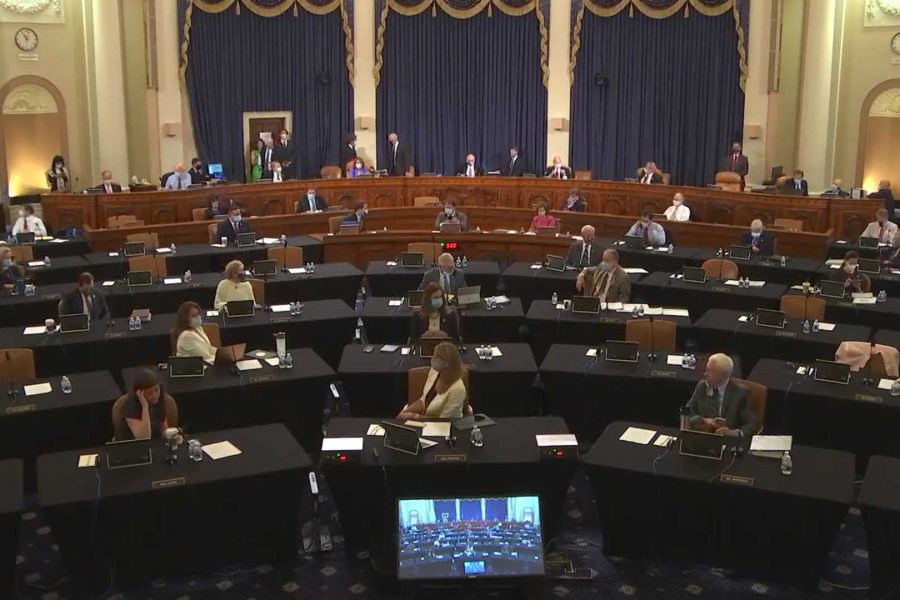The House Armed Services Committee argued its way through its version of the fiscal 2021 defense policy bill on July 1, ultimately approving the annual legislation 56-0.
The unanimous vote is a stark departure from the committee’s 33-24 vote last year, which largely fell along party lines after a contentious marathon debate. In comparison, this markup lasted only about 14 hours.
One of Congress’s most traditional lawmaking processes is taking place under the least traditional circumstances, thanks to the ongoing coronavirus pandemic. Members debated in the House Ways and Means Committee room, which was cavernous enough to let mask-clad lawmakers spread out across several rows of tables. Most members attended in person, while some opted to teleconference in from home.
Hot-button issues of the day spanned whether to remove U.S. troops from Germany, a key hub for global military operations; how to rename bases honoring Confederate figures; and the President’s ability to command National Guardsmen. Lawmakers also talked at length about Ground-Based Strategic Deterrent nuclear missiles; sexual assault in the armed forces; and cleaning up industrial “forever chemicals” that have potentially contaminated the area near hundreds of military installations.
Arguments over Germany pitted members like Reps. Matt Gaetz (R-Fla.) and Ro Khanna (D-Calif.), who sit on opposite ends of the political spectrum but believe the military is overspending and overextending itself abroad, against lawmakers who say leaving an important strategic post would damage the military’s ability to respond to threats around the world and keep an eye on Russia.
President Donald J. Trump has approved a plan to move 9,500 troops out of Germany, capping the U.S. presence there to about 25,000 people. HASC adopted an amendment looking to block that withdrawal, as well as a broader drawdown in Europe, unless the Pentagon presents a report showing that doing so wouldn’t damage the security of the U.S. or its allies.
“It’s more important than ever to ensure the continued security of our Baltic allies and therefore our own national security interests,” said Rep. Ruben Gallego (D-Ariz.), the amendment’s sponsor. “Trump’s plan to quickly and drastically reduce U.S. military presence in Germany is baffling and ill-advised.”
The committee also wants the Pentagon to rename military property named after Confederate leaders, including 10 major Army installations honoring Civil War commanders that are located in former Confederate states. An adopted amendment would make that happen within a year after the National Defense Authorization Act is signed into law.
Following last year’s extensive debate over nuclear modernization, lawmakers again skirmished over whether to look into the prospect of keeping the Air Force’s current Minuteman III nuclear missiles around longer, and whether to move $1 billion from the GBSD program into a Pentagon pandemic preparedness fund. Neither proposal prevailed.
Shortly before midnight, members voted to name the bill after Rep. Mac Thornberry (R-Texas), the retiring ranking member who led the committee from 2015 to 2019.
Meanwhile, across Capitol Hill, Senate Armed Services Committee Chairman Sen. Jim Inhofe (R-Okla.) indicated senators have come up with their own bipartisan defense authorization bill that would win the chamber’s approval.
“I want to thank all my colleagues and … [Ranking Member Sen. Jack Reed] for working so hard today to come to an agreement,” Inhofe said July 1. “We will be hotlining it tonight. The Senate will come back into session at 10 tomorrow morning, and hopefully we will be able to lock in our deal here.”
When both chambers pass their authorization bills, they will create a compromise version for congressional and presidential consideration. While it offers money to the Defense Department, an appropriations bill will ultimately decide what the military can spend.
Trump warned he would veto the NDAA if it tried to rename Confederate bases. Inhofe dismissed the comment, saying a lot can change by the time Congress passes the final version this fall.
